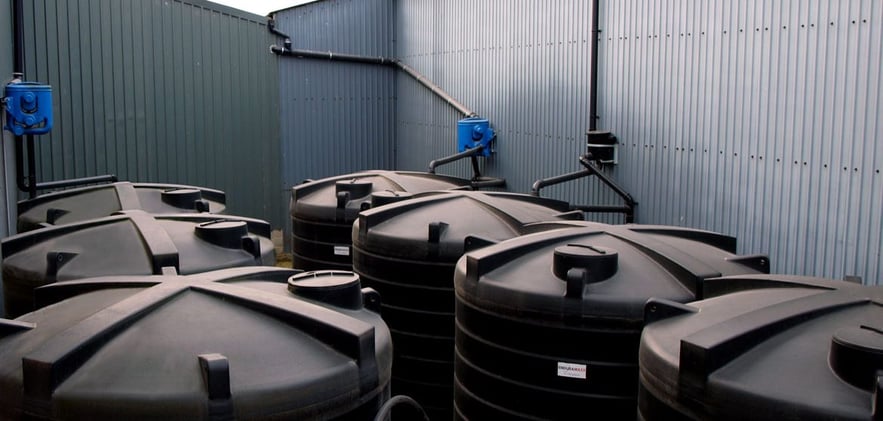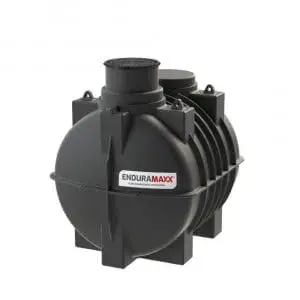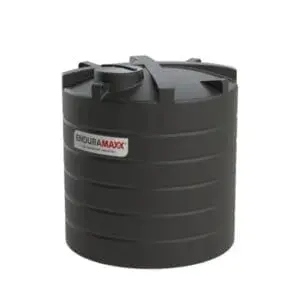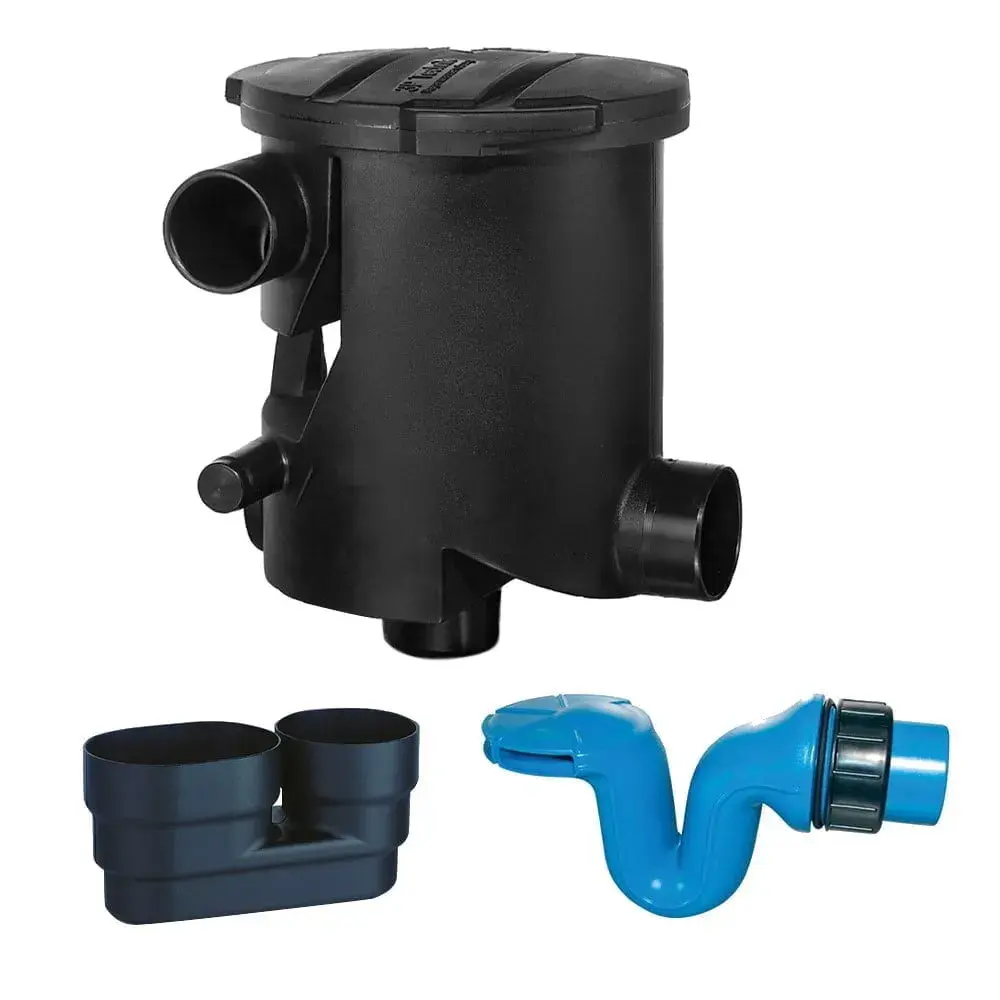Rainwater harvesting on the farm – water is essential for farming – but the supply varies from place to place and in some parts of England and Wales the supply is scarce. And climate change is not going to make things any better.
Is Rainwater Harvesting Right For You?
Yet rainwater is free (almost). It gives you a margin of safety in times of drought. It can save you money and even improve some aspects of farming. All types of farming can benefit – arable, livestock, protected cropping, pigs and poultry, the storage and processing of food.
As a bonus, farmers who harvest rainwater are making an impact on saving our environment for future generations.
What Do We Mean by Rainwater Harvesting?
Rainwater harvesting means collecting the rainwater from the surface it falls on and storing it to be used later. In the UK, rainwater is usually collected from roofs. And many farms have a lot of roof space. This water would otherwise have disappeared down the drains, flooded the fields or simply been evaporated away.
How Do We Collect The Rainwater?
First, the rainwater is collected, filtered, and stored. Then it is just waiting to be pumped either directly to where you intend to use it or into pipes or portable tanks for distribution around the farm. Sometimes the water needs treatment to improve its quality for specific tasks.
It is important to realise that there may be times when the rainwater supply is not enough, and it will need to be backed up by the mains supply. It is recommended that farmers store enough for three months’ supply.
Three systems are in use: direct pump, indirect pump, and gravity fed. Other elements of the rainwater collecting system include the filter, any treatment systems you need, storage in tanks of various sizes and shapes and drainage for overflow.
The Enduramaxx harvesting filters are designed to both stop leaves, moss, and other debris from entering the storage tank – and also to soften the water. They come in various sizes to suit the location. You can choose a basket filter or even ones that clean themselves thus saving you time and energy.
To discourage the growth of algae the water is oxygenated in the darkness – and calming inlets make sure that any sediment is left undisturbed.
Saving The Environment
Our planet is drying up. Inland seas are disappearing, fires are raging in countries as far apart as Brazil, the USA and Australia and drought is destroying farms in many areas of the world. It makes sense to protect our environment as far as possible and many farmers play a frontline role in this.
Saving Money
You might be able to save up to 50% of your mains water bill. You will need to compare your present water usage and costs with that of installing and maintaining a harvesting system for rainwater.
But you need to ask a few questions first:
- Does it rain enough? The Met office has a good online rainwater calculator here
- Do you have a suitable collection place?
- What will you be using the water for – and what quality do you need?
Is It Eco-Friendly?
You will need to compare possible savings with capital and maintenance costs. At present the water costs around £1 and £2 per cubic metre. This is likely to go up!
But first- how efficient is your present usage?
- It is worthwhile checking to see how much water you are wasting right now! Here is a checklist!
- Stopping leaks.
- Dripping taps and hosepipes.
- Reducing pressure.
- Are there other ways to wash and clean?
- Have you made the best irrigation schedule? (Reducing evaporation where possible)
Benefits of Rainwater.
- Chemical-free. Rainwater is free from chemicals such as chlorine that has been added to the mains water – and this is better for many crops. Rainwater also benefits from having a balanced ph. While it is unfit for human consumption, it can be an ideal alternative to mains water for your livestock. But you may need filtration and/or UV treatment for some crops or for livestock feeds and cleansing.
- Reduced risk of flooding. When you collect the rainwater, you stop it from entering the storm-water management system, which can become overloaded during periods of heavy rain. The risk of flooding is increasing as our climate becomes ever more extreme.
- Reduced sewer costs. When your water is discharged into a sewer, you will be charged. Reducing this reduces your water bill.
- Reduce your slurry store size. By diverting the rainwater into your storage system, you will reduce the amount flowing across your yard, entering the slurry store or your dirty water tank. You will end up with less dirty water to get rid of and a smaller slurry store.
- Reduce dependence on mains supply for irrigation. As our population is growing, so the demand for water grows – and by using rainwater you can relieve some of the pressure on our mains, which rely on lakes, rivers, and groundwater sources.
View James’s rainwater case study here
What Quality of Water do you Need?
Even rainwater contains pollutants collected from the atmosphere. There may be bird faecal matter and leaves and moss. The roof might contain lead or asbestos. For this reason, you may need to treat your rainwater before using it for certain tasks. And, of course, it all needs to be filtered.
For crop irrigation
The World Health Organisation (WHO) has set standards for harvested water when it is used for crop irrigation. In addition, food retailers impose standards you have to meet, which are generally higher than WHO recommends.
For animal drinking
There may be assurance standards you need to adhere to. The Dairy Hygiene Regulations say that water used for hand, udder or dairy plant washing must be from a potable source, i.e., usually the mains. The National Dairy Farm Assurance Scheme (NDFAS)states that water for animals to drink must be “fresh and clean”, and you may need to treat your rainwater to meet these criteria.
What Kind of Farm Can Use Rainwater?
Arable farms
You have a large roof just waiting to be used? The water uses include irrigation for root crops and vegetables, washing the vegetables and machinery, washing the yards and spraying crops. It can also help with suppressing dust.
Pigs and Poultry
Rainwater can help to suppress dust and washing the sheds but will need to be treated if you intend to let the livestock drink it.
Cattle
Dairy farms pay between £31 and £100 for water for each cow. Imagine saving 20% of this with rainwater. You could use it for washing the pens and vehicles and managing the slurry. After treatment, you could let the animals drink it and you could prepare their feeds with it.
How Much Will It Cost?
The cost depends upon the amount of water you collect and store. The size of filters and tanks, pumps, and filtration systems, plus the running costs and maintenance.
Calculating the Cost of Setting up the System
You will need to know how much water you use (water bill) and the average rainfall (the met office stats). Then once you know your rooftop area you can calculate the optimum size of the tank for your storage.
View our post on why we recommend a rainwater harvesting system installer here.
What About the Storage Tank?
Storage tanks come in many shapes and sizes. At Enduramaxx we believe that our moulded polythene, one-piece tanks are easy to install and that costs less than the traditional, sectional metal tanks. Tanks can be placed above or below ground.
What Permissions Do I Need?
For rainwater harvesting on the farm and agricultural rainwater harvesting systems, there are some legal issues to take into account. These may include:
- Planning and building regulations. New buildings and alterations to existing ones may need permission – you will need to ask your local authority.
- Quality testing for hand washing, udder or dairy plant washing or for irrigating of ready-to-eat crops. An Environmental Health Officer will need to check the quality of the water every year. You will need to check that it satisfies any farm assurance schemes or contracts.
- Environmental permitting for pigs and poultry.
- Water discharge. If you are discharging water from your rainwater harvesting system into a watercourse, the Environment Agency must give consent. Uncontaminated water can be discharged into surface water drains, but dirty water, from for example roof vented poultry houses, needs treatment or disposal as dirty water. When you discharge dirty water into a sewer your local sewerage company needs to know. It is better to remove the source of the contamination if possible.
- Health and safety. Sometimes water treatment is required before making it suitable for drinking water for animals and livestock.
- Nitrate Vulnerable Zones. Around 55% of the land in England is considered to be at risk from nitrate pollution from farms. The Department for Environment, Food and Rural Affairs (Defra) checks these zones every four years.
You Have A System – But It Fails To Rain?
Here in the UK, it rains throughout the year – generally. But during drier parts of the year or when your water use is high, your storage of rainwater may not be enough. For that reason, your tank could have a mains top-up valve. You can set these at 10-90% of the capacity of your tank. But note that there are Fluid Category 5 regulations to comply with.
The Five Most Common Uses For Rainwater Harvesting In The UK Now
As well as rainwater harvesting on the farm, these are the five most common domestic uses and water consumption which Enduramaxx Rainwater Harvesting tanks are used for in the United Kingdom:
- Watering the garden – changing weather patterns mean that an increasing number of gardeners rely on rainwater.
- Washing the car – and the average car wash uses 35 litres of water.
- Filling ponds in the garden – chlorine-free water is better for aquatic life.
- Flushing the toilet – toilet flushing accounts for up to 35 litres on average per person per day.
- Washing clothes – especially useful for washing machines in hard water areas to prevent the build-up of limescale.
It seems surprising that farmers are not at the top of the list!
Conclusion
Rainwater harvesting makes a lot of sense. You can nearly always save money, even allowing for the initial capital costs. Once the system is set up it requires a little maintenance, but you can enjoy the benefits of clean, chemical-free water suitable for ma uses around the farm.
Your crops flourish on rainwater, you are less likely to experience flooding, and you are not at the mercy of a limited water supply during droughts since you have storage capacity in hand. The rainwater from your roof area is suitable for many uses around the farm thus making you less reliant on the mains and cutting your water bill.
Rainwater harvesting makes you more independent – and it saves you money. For more details on rainwater harvesting on the farm and rainwater harvesting solutions, rainwater harvesting for farmers and water tank pricing for to collect water – please get in touch today on 01778 301528 or view our rainwater tanks online here
Posts By Topics
- Blog (303)
- Chemical Storage Tanks (118)
- Chemical Dosing Tanks (114)
- Chemical Tanks (114)
- Water Tanks (58)
- Rainwater Harvesting Tanks (43)
- Vertical Rainwater Tanks (31)
- Vertical Storage Tanks (31)
- Cone Bottom Tanks (19)
- Conical Cone Tanks (18)
- Rainwater Harvesting (17)
- Water Bowsers (15)
- Horizontal Tanks (14)
- Potable Water Tanks (13)
- Farming (9)
- Case Studies (8)
- Industrial Storage Tanks (7)
- Liquid Fertilser Storage Tanks (6)
- WRAS Approved Potable Tanks (6)
- Wine and Beer Production (6)
- Horizontal Transport Tanks (5)
- Microbrewery (5)
- Rainwater (5)
- Category 5 Break Tanks (4)
- Cider Production (4)
- Mixer Tanks (4)
- Molasses Tanks (4)
- Polyethylene tanks (4)
- Rainwater Filter Kits (4)
- SPECIALIST & BESPOKE TANKS (4)
- Bunded Tanks (3)
- Slimline Tanks (3)
- WRAS Approved (3)
- Clarification Tanks (2)
- Crosslinked Polymer Tanks (XLPE) (2)
- Fertiliser Tanks (2)
- Sump Tanks (2)
- Tank Installation (2)
- Water Butt (2)
- underground water tanks (2)
- ACCESSORIES & FITTINGS (1)
- ATV & UTV SPRAYING UNITS (1)
- Above Ground Effluent Tanks (1)
- Bespoke Tank Frames (1)
- Category 5 Turret (1)
- Caustic Soda Tanks (1)
- Closed Top Bunded Tanks (1)
- Craft beer (1)
- Effluent Tanks (1)
- Enduramaxx (1)
- Ferric Chloride Tanks (1)
- Fire Safety Regulations (1)
- Fire Sprinkler Water Storage Tanks (1)
- Industrial Water Tank (1)
- Open Top Bunded Tanks (1)
- Open Top Cone Tanks (1)
- Open Top Vertical Tanks (1)
- Polyethylene Potable Water Tanks (1)
- Polyvinylidene Fluoride (PVDF) Tanks (1)
- Polyvinylidene Fluoride Tanks (PVDF) (1)
- Pressure Washers (1)
- Pro Series Spot Sprayers (1)
- RWH (1)
- Sodium Hydroxide Storage Tanks (1)
- Sprayer Fill-up Tanks (1)
- Uncategorised (1)
- liquid fertiliser tank (1)
Sign up to the newsletter
enduramaxx.marketing
Related Posts
Rainwater Harvesting for Beef and Sheep Farms
Rainwater Harvesting for Beef and Sheep Farms, it is possible for farmers to save up to 90% of the...
Rainwater Harvesting Calculator UK: How Much Rainwater Can I Save?
Rainwater harvesting calculator UK – rainwater harvesting can be carried out on any building...
A Guide On How To Harvest Rainwater On A Farm
A lot of farmers carry out rainwater harvesting on a farm for use for sprayers, washdown, pressure...
Related Products
From £1,080.00 inc. VAT
£900.00 exc. VAT
From £1,344.00 inc. VAT
£1,120.00 exc. VAT
From £768.00 inc. VAT
£640.00 exc. VAT
£480.00 inc. VAT
£400.00 exc. VAT







